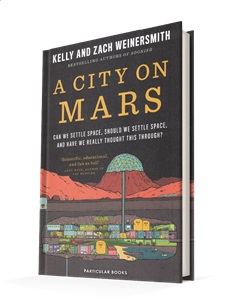Your opinion of this book will depend on whether you like your space books dry with studied arguments and academic references, or wet with gushing prose and witty asides. If the authors of this chunky volume were forced to choose between my limited options, they would doubtless argue that it was ideally placed somewhere between the two extremes (…shall we say ‘moist’?).
My stereotypically British reserve is against the super-chatty style of this book - and I particularly dislike the childish diagrams - but the authors are ‘spot on’ with some of their critiques of the space sector. Although they are long-term, self-professed “space geeks”, they have in recent times become more sceptical of the grandiose promises, missed deadlines and stagnation of the sector. For example, they write: “After a few years of researching space settlements, we began in secret to refer to ourselves as the “space bastards” because we found we were more pessimistic” than almost everyone else in the field.
This is, of course, a function of age and experience. One could also add complaints about a system that oversells itself because it is always looking forward to the next technological development, contract or funding round, and the inability of entrepreneurs to learn from the past. Perhaps, instead of posting continually on social media, they should sit down quietly and read some history!
The book’s subtitle - “Can we settle space, should we settle space, and have we really thought this through?” - is, like most of the headings and subheads, verbose, but that’s part of its pop-science ethic. Its six main parts cover space physiology, places to live off-world, human factors, space law, sovereignty and ownership, and future space society and risk. Appendices add 10 pages of chapter notes, a 20-page bibliography and a decent index.
It’s a difficult book to review in four or five hundred words, because one wants to quote so many examples. Suffice it to say that, if you enjoy an irreverent romp through the hallowed ground of the space profession - learning when to “get naked” on a space station and how many tampons to take on an average space mission - you will enjoy this book. One of the ‘in-jokes’ that raised a smile was the authors’ description of the International Astronautical Congress: “think space-nerd prom, only with major officials from world government and space agencies”. Not something you’ll ever see in IAC publicity, but it certainly summarises this book’s attitude to authority!











